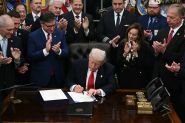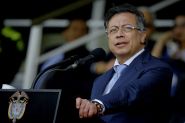- Home
- Middle East
- Vladimir Putin to Run for 2024 Reelection

©(Sergei Bobylyov, POOL, AFP)
Russian President Vladimir Putin declared his candidacy for the 2024 election, signaling the potential continuation of his rule until 2036, with analysts foreseeing no significant opposition in the political landscape.
President Vladimir Putin announced on Friday that he will run for re-election in 2024, extending his decades-long grip on power into the 2030s. Putin, who has led Russia since the early 2000s, revealed his decision after an awards ceremony at the Kremlin.
“I will run for president of the Russian Federation,” Putin declared, stating that there is “no other way” for him but to seek re-election.
The 71-year-old has led Russia since the turn of the century, winning four presidential ballots and briefly serving as prime minister in a system where opposition has become virtually non-existent.
With no significant challengers expected, analysts believe he aims to secure a broad mandate amid domestic discord over the Ukraine conflict.
Following a controversial constitutional reform in 2020, Putin could stay in power until at least 2036.
[readmore url="https://thisisbeirut.com.lb/world/203966"]
Rights groups express concerns about election transparency, citing media restrictions and past irregularities. In November, Putin tightened media rules on covering the 2024 election, banning some independent media outlets from accessing polling stations.
 Vladimir Putin addressed a rally in Moscow, commemorating the annexation of Ukrainian regions by Russian troops on September 30, 2022. (Alexander Nemenov, AFP)
Vladimir Putin addressed a rally in Moscow, commemorating the annexation of Ukrainian regions by Russian troops on September 30, 2022. (Alexander Nemenov, AFP)
The election is scheduled for March 15-17, with five Kremlin-supported parties participating. Putin's key rival, Alexei Navalny, is in prison, and the Kremlin faces criticism for its crackdown on dissent amid the prolonged Ukraine offensive.
Despite Western sanctions that initially prompted an exodus of Western companies and turbulence in industry, the economy has proven resilient and Putin's domestic approval ratings have remained high.
Moscow has re-oriented much of its energy exports to Asian clients including China, allowing it to continue pouring money into the offensive, now in its 22nd month.
The Kremlin, echoing past strategies, frames the election as a battle against perceived Western values, exemplified by recent labeling of the “international LGBT movement” as extremist in a broader culture war.
Miroslava Salazar, with AFP
President Vladimir Putin announced on Friday that he will run for re-election in 2024, extending his decades-long grip on power into the 2030s. Putin, who has led Russia since the early 2000s, revealed his decision after an awards ceremony at the Kremlin.
“I will run for president of the Russian Federation,” Putin declared, stating that there is “no other way” for him but to seek re-election.
The 71-year-old has led Russia since the turn of the century, winning four presidential ballots and briefly serving as prime minister in a system where opposition has become virtually non-existent.
With no significant challengers expected, analysts believe he aims to secure a broad mandate amid domestic discord over the Ukraine conflict.
Following a controversial constitutional reform in 2020, Putin could stay in power until at least 2036.
[readmore url="https://thisisbeirut.com.lb/world/203966"]
Rights groups express concerns about election transparency, citing media restrictions and past irregularities. In November, Putin tightened media rules on covering the 2024 election, banning some independent media outlets from accessing polling stations.
 Vladimir Putin addressed a rally in Moscow, commemorating the annexation of Ukrainian regions by Russian troops on September 30, 2022. (Alexander Nemenov, AFP)
Vladimir Putin addressed a rally in Moscow, commemorating the annexation of Ukrainian regions by Russian troops on September 30, 2022. (Alexander Nemenov, AFP)The election is scheduled for March 15-17, with five Kremlin-supported parties participating. Putin's key rival, Alexei Navalny, is in prison, and the Kremlin faces criticism for its crackdown on dissent amid the prolonged Ukraine offensive.
Despite Western sanctions that initially prompted an exodus of Western companies and turbulence in industry, the economy has proven resilient and Putin's domestic approval ratings have remained high.
Moscow has re-oriented much of its energy exports to Asian clients including China, allowing it to continue pouring money into the offensive, now in its 22nd month.
The Kremlin, echoing past strategies, frames the election as a battle against perceived Western values, exemplified by recent labeling of the “international LGBT movement” as extremist in a broader culture war.
Miroslava Salazar, with AFP
Read more



Comments